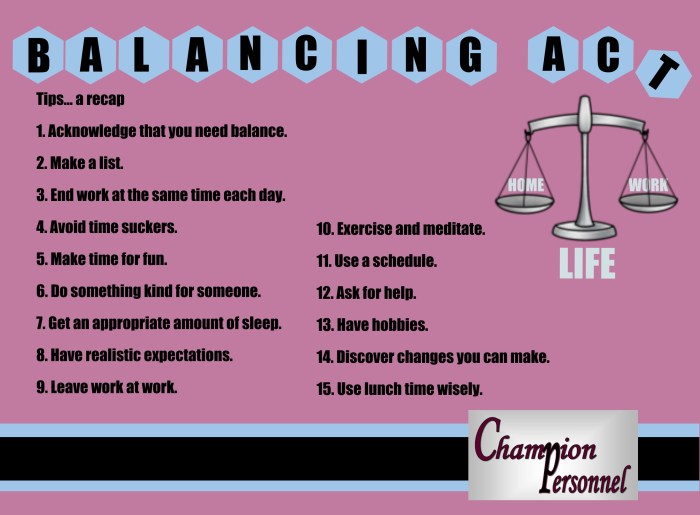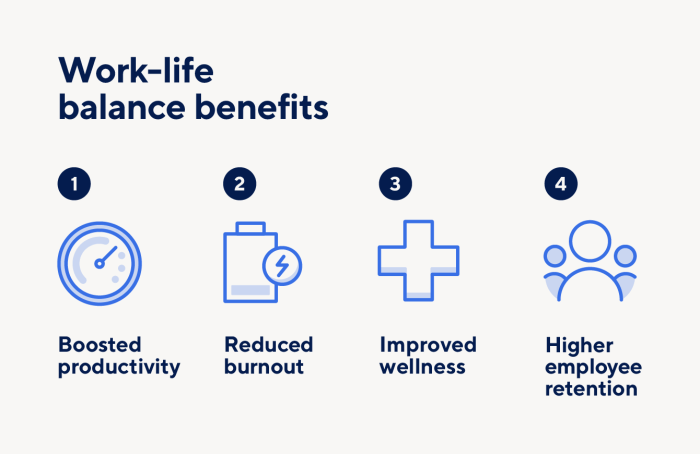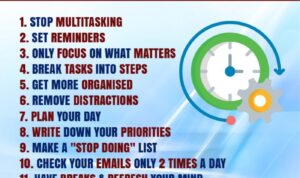Work-Life Balance Tips takes center stage, inviting readers into a world of perfect harmony between work and personal life, ensuring productivity and happiness go hand in hand.
Struggling to find that perfect balance? Look no further as we dive into practical strategies and healthy habits to help you conquer the work-life tightrope with finesse.
Importance of Work-Life Balance
Achieving work-life balance is crucial for overall well-being as it helps individuals maintain a healthy lifestyle, reduce stress, and prevent burnout. Balancing work and personal life allows individuals to prioritize self-care, spend quality time with loved ones, and pursue personal interests outside of work.
Benefits of Maintaining Work-Life Balance
- Improved physical and mental health
- Reduced stress and anxiety levels
- Enhanced relationships with family and friends
- Increased job satisfaction and productivity
Enhancing Productivity and Job Satisfaction, Work-Life Balance Tips
Maintaining a healthy work-life balance can lead to increased productivity as individuals are more focused, motivated, and energized when they have time to rest and recharge outside of work. This balance also contributes to job satisfaction by creating a sense of fulfillment and overall happiness in both professional and personal aspects of life.
Strategies for Achieving Work-Life Balance

Achieving work-life balance is essential for overall well-being and productivity. Here are some practical strategies to help you manage your time effectively and set boundaries between work and personal life:
Time Management Tips
- Prioritize tasks based on deadlines and importance.
- Use a planner or digital calendar to schedule work and personal activities.
- Avoid multitasking and focus on one task at a time.
- Take regular breaks to avoid burnout and maintain focus.
Setting Boundaries
- Establish specific work hours and stick to them.
- Create a designated workspace to separate work from home life.
- Communicate your boundaries clearly with colleagues and family members.
- Turn off work notifications outside of work hours to disconnect.
Delegating Tasks and Seeking Support
- Delegate tasks that can be handled by others to reduce your workload.
- Ask for help from coworkers or family members when needed.
- Consider hiring a virtual assistant or utilizing technology to streamline tasks.
- Remember that it’s okay to ask for support and prioritize your well-being.
Healthy Habits to Support Work-Life Balance
Maintaining a healthy lifestyle is crucial for achieving work-life balance. When we take care of our physical and mental well-being, we are better equipped to handle the demands of work and personal life. Here are some tips on incorporating healthy habits into your routine:
Exercise Regularly
Regular exercise is not only good for your physical health but also helps reduce stress and improve mood. Try to include at least 30 minutes of exercise into your daily schedule, whether it’s going for a walk, practicing yoga, or hitting the gym. Find an activity you enjoy to make it easier to stick to a routine.
Practice Mindfulness
Mindfulness practices, such as meditation and deep breathing, can help you stay present and focused, reducing anxiety and increasing productivity. Start your day with a few minutes of mindfulness or incorporate short meditation breaks throughout the day to clear your mind and reduce stress.
Eat a Balanced Diet
Proper nutrition plays a significant role in our energy levels and overall well-being. Make sure to eat a balanced diet rich in fruits, vegetables, whole grains, and lean proteins. Avoid skipping meals and opt for healthy snacks to keep your energy levels stable throughout the day.
Prioritize Sleep
Getting enough quality sleep is essential for cognitive function, mood regulation, and overall health. Aim for 7-9 hours of sleep per night and establish a bedtime routine to help you unwind and prepare for rest. Avoid screen time before bed and create a relaxing environment conducive to sleep.
Technology and Work-Life Balance: Work-Life Balance Tips

In today’s digital age, technology plays a significant role in both supporting and hindering our work-life balance. It offers convenience and efficiency in our professional lives but can also lead to burnout and constant connectivity that blurs the line between work and personal time.
Mindful Technology Use
- Avoid checking work emails or messages outside of designated work hours to create boundaries between work and personal time.
- Use productivity apps or tools to streamline tasks and prioritize work effectively, allowing you to accomplish more in less time.
- Set specific time limits for social media and other leisure activities on electronic devices to prevent distractions and maintain focus on work tasks.
Unplugging for Balance
- Designate tech-free zones or times in your home to promote relaxation and connection with loved ones without the distractions of screens.
- Engage in activities that do not involve technology, such as reading a book, exercising, or spending time outdoors to recharge and rejuvenate away from screens.
- Practice mindfulness and meditation to center yourself and reduce stress caused by constant digital stimulation, allowing for better work-life balance overall.

